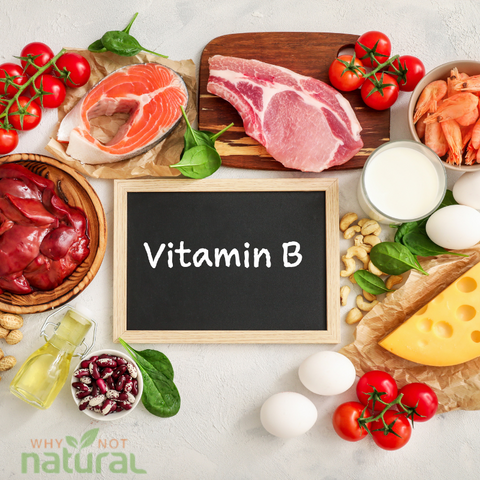

· By Lorea Lastiri
Choosing the Right Vitamin B Complex: Your Essential Guide
When it comes to selecting the ideal B complex, the choices can be overwhelming. With so many options on the market, from activated B vitamins to slow-release versions, how can you choose the one that best meets your requirements?
To guarantee that a B complex meets your needs, you must evaluate elements like form, delivery, and potency. Understanding the vitamin B complex will enable you to make better choices regarding your diet and supplement requirements.
This article will reveal everything you need to know about vitamin B complex, including its health advantages and the signs of vitamin B complex deficiencies. But first, let's talk about what vitamin B complex is and how it affects your body.
Understanding vitamin B complex
B-complex supplements contain all of the vitamin Bs. Scientists have classified the eight B vitamins as a "complex" because they have three important characteristics: they are water-soluble, operate as coenzymes (helper molecules in biochemical activities), and the majority are involved in cellular energy production.
Aside from their shared characteristics, each B vitamin has a distinct purpose in the body and should be evaluated independently to promote a good diet and general health.
The body uses B vitamins for various processes, such as metabolism, synthesizing red blood cells, and producing energy. They are water-soluble, which means they are not retained in the body and must be supplied regularly via diet or supplements.
B complex supplements are a popular way to ensure you get enough of these essential elements.
The actual composition of the B complex varies depending on the manufacturer, although it usually contains all eight B vitamins in variable quantities, which we’ll explore below.
Is there a difference between vitamin B12 and complex?
The distinction between vitamin B12 and B complex is that vitamin B12 is only one of eight B vitamins that comprise the B complex. The set of eight B vitamins that comprise the B complex are supplied in the optimal balance to meet the required daily allowance.
All B vitamins are water-soluble and cannot be stored in the body. The good news is that you cannot 'overdose' on B vitamins because your body will eliminate what it does not require or use.
As a result, it is allowed to take various multivitamins, including vitamin B12 and B Complex vitamins. The bad news is that you must consume them in sufficient quantities daily.
You may also like: B12 vs B Complex
What is the most important B vitamin?
Identifying the most important B vitamins is tough because they all play important roles in diverse biological functions.
Here is a brief breakdown of each vitamin B so that you can better understand its role in your body:
- Thiamin or B1 vitamin: Vitamin B1 is a vital nutrient for the proper functioning and growth of organs, including the brain and heart.
- Riboflavin or B2 vitamin: The body needs vitamin B2 to digest fats and medicines.
- Niacin or vitamin B3:The body requires niacin to maintain healthy skin, nerves, and digestion. Doctors may prescribe high dosages of niacin to deal with cholesterol levels.
- Pantothenic or vitamin B5:It is necessary for proper brain and nervous system function.
- Pyridoxine or B6 vitamin: Vitamin B6 helps the body produce new red blood cells, which transport oxygen throughout the body. It also strengthens the immune system.
- Biotin, or vitamin B7: It is necessary for proper hair, nail, and nerve function.
- Folic acid or vitamin B9: The body converts folic acid, often known as folate, into DNA and genetic material. Sufficient intake of folic acid before and during pregnancy can help reduce the occurrence of certain congenital disabilities.
- Cobalamin, or vitamin B12: It is required by the body's nerves and blood cells. Adequate quantities of B12 also help to avoid pernicious anemia, a vitamin shortage.
Factors to consider when choosing a vitamin B complex supplement
When selecting a vitamin B complex supplement, it's essential to consider the following factors:
Blend's health impact
A decent B-complex supplement will provide numerous health benefits and improve various aspects of your well-being. The B complex you select should contain a minimum of thiamine, riboflavin, niacin, pantothenic acid, and pyridoxine.
Check the label or product page to see if a vitamin supplement contains all essential B vitamins. Our B-Complex contains ALL 8 B Vitamins, B1, B2, B3, B5 B6, Biotin (B7), Folate (B9), and cobalamin (B12), and all bioavailable active forms.
It will help you gain energy, enhance your mood, improve your cognitive function, assist your metabolic processes, and much more.
Dosage
Even if a vitamin contains all the aforementioned components, you will not reap the advantages without knowing the proper amounts. So, compare the B-complex dosages to the RDAs.
Also, ensure the vitamins are in a form your body can easily absorb.
Energy conversion and fatigue reduction capabilities
Choosing a B-complex vitamin requires understanding its role in energy conversion and reducing tiredness.
Essential B vitamins such as B1, B6, and B12 are critical for converting food into energy. Without enough of these vitamins, you will likely experience fatigue, which will impair your everyday performance.
Simply search for a B-complex containing B1, B6, and B12 in quantities that meet or exceed your body's daily requirements.
Our B-Complex is designed to meet these needs by providing a balanced blend of B vitamins in quantities designed to enhance energy levels and keep you from becoming exhausted.
Clean formulas and production standards
It's essential to understand what goes into your dietary supplements. A clean formula indicates that the product is free of extra fillers, artificial colors, and bulking agents.
Our B-Complex is free of unnecessary additives like synthetic preservatives or sugar. We concentrate on providing the nutrition you require without any additives.
What are the benefits of B complex vitamins?

The B vitamins enable enzymes in our bodies to do their work and are essential for various cellular activities, such as glucose breakdown and nutrition transfer. Furthermore, the B complex can offer other health benefits such as:
Relieves stress and improves mood
B-complex vitamins are commonly used to combat fatigue and improve mood. Some research suggests that B vitamins can boost your mood and cognitive performance.
A 33-day trial of 215 healthy males revealed that taking a high-dose B-complex and mineral supplement improved overall mental health, mood, and cognitive test performance.
Another study in young adults found that taking a multivitamin with high doses of B-complex vitamins for 90 days decreased stress and mental fatigue.
Improves brain function
The B vitamins play an interconnected role in keeping our brains functioning properly. Adequate levels of B vitamins are necessary for proper neurological and physiological function.
According to some research, vitamin B6, in particular, may help prevent Parkinson's disease.
Prevents cancer
B vitamins may help prevent the start of different cancers. According to some research, having an adequate supply of B vitamins in your body may aid in the prevention of malignant growth.
Vitamin B intake has been associated with a reduced risk of skin cancer, particularly melanoma.
Alleviates symptoms of anxiety and depression
While B-complex vitamin supplements are not a panacea for mental illnesses, they can help alleviate symptoms of sadness and anxiety.
A study of 60 people with depression found that treatment with a vitamin B complex led to significant reductions in depression and anxiety when compared to a placebo.
B vitamins may improve therapeutic responses when used with antidepressant medications. One study found that supplementing with a vitamin comprising B12, B6, and folic acid resulted in a more effective and long-lasting antidepressant response over a year than a placebo.
Low blood levels of particular B vitamins, such as B12, B6, and folate, have been associated with a high risk of depression, so it's critical to rule out dietary deficiencies if you're having symptoms of sadness.
Helps in the healing of wounds on the skin
According to a study, applying these vitamins to the skin may help wounds heal more effectively. An animal study discovered that B12 enhanced wound healing in diabetic mice, but further research on people is needed to corroborate these findings.
Heals canker sores
Vitamin B12 may help heal canker sores, often known as mouth ulcers. In another research, a B12 ointment alleviated pain better than a placebo when used as an adjuvant therapy in conjunction with primary treatment.
What are the symptoms of a vitamin B complex deficiency?

A balanced diet provides most people with adequate amounts of B vitamins. However, it is still possible to be deficient, especially if you have been taking certain medications for a long time, such as proton pump inhibitors, or if you eat a strictly vegan or vegetarian diet.
The following symptoms may indicate that you are not getting enough B vitamins:
- Skin rashes
- Cracks around the mouth
- Scaly skin on the lips
- Symptoms include swelling tongue, tiredness, and weakness
- Anemia
- Possible symptoms include disorientation, irritation, or depression
- Nausea
- Abdominal cramps
- Diarrhea
- Numbness
Schedule an appointment with your doctor if you are experiencing any of these symptoms.
Vitamin B deficiency may cause these symptoms, but other illnesses can also cause them. Your doctor can make a diagnosis and guide you through the next steps.
Who should take vitamin B complex supplements?

Vitamin B-complex supplements may be beneficial for people who fall into the following categories:
Pregnant women
B vitamins are especially crucial during pregnancy when one should consume at least 400 mcg of folic acid daily.
Ideally, this would happen in the months before becoming pregnant. Due to certain conditions, some individuals may require using methylated folate to an MTHFR gene variation that prevents folic acid from being broken down.
Furthermore, pregnant women should get folate from meals, a natural form of folic acid. According to the Centers for Disease Control and Prevention, consuming the required folic acid and folate levels lessens the risk of brain and spinal cord birth abnormalities.
Pregnant women also require sufficient amounts of vitamin B12. According to research, vitamin B12 insufficiency is associated with miscarriage, low birth weight, high blood pressure in pregnant women, and fetal malformations.
Vegetarians and vegans
A vegetarian diet excludes meat, such as cattle, poultry, and fish. A vegan diet is a type of diet that strictly avoids any food that comes from animals, including meat, eggs, and dairy products.
Vegetarian and vegan diets may raise the risk of B12 deficiency. Meat, eggs, and dairy contain this vitamin.
People who consume eggs and dairy products may acquire the B12 they require from these sources. However, those who avoid animal products may require supplements.
People who have undergone gastric bypass surgery
Individuals who have undergone gastric bypass surgery (commonly known as bariatric surgery) frequently require vitamin supplements.
The procedure increases a person's requirement for vitamin B12. There is more evidence that many people require a multivitamin, including all the B vitamins and other nutrients, following this operation, at least in the short term.
Older adults
B-complex supplements may be beneficial for people over the age of 65.
Research shows that older adults are more likely to have vitamin B12 insufficiency. Some data suggest that higher B12 levels may help reduce brain aging.
A comprehensive review and meta-analysis found that low levels of B12 and folate may be linked to depression in older adults.
Who should avoid taking vitamin B complex?
Unless your doctor confirms you are low in a specific B vitamin, you do not need a supplement. If they discover a deficit, they will most likely advise you to take a specialized B supplement or add a vitamin B complex supplement to your regimen.
Consult your doctor about your vitamin B consumption if you have:
- Celiac illness
- HIV
- Crohn's disease
- Alcohol Use Disorder
- Kidney conditions
- Rheumatoid arthritis
- Ulcerative colitis,
- Inflammatory bowel disease
How long does it take for the vitamin B complex supplement to take effect?
The anecdotal effects of B vitamins can be quick, but research has shown that B vitamins (together with vitamin C and minerals) make people feel more alert after about two weeks.
The time it takes for a vitamin B complex supplement to take effect varies according to the individual's needs and deficits.
Generally, increases in energy levels and overall well-being can be seen after a few weeks of frequent intake. However, more severe deficiencies or diseases may necessitate a longer duration of treatment before significant benefits are observed.
Does vitamin B complex supplement have side effects?
B vitamins are water-soluble, which means the body excretes excess B vitamins in urine most of the time.
While a regular amount is not harmful, very large quantities of particular B vitamins can be hazardous. Consult a doctor before using extremely high doses of B-complex vitamins.
Potential adverse effects of B-complex vitamins include:
High blood sugar
High doses of nicotinic acid can elevate blood sugar levels. This may interfere with diabetic treatments. People with diabetes or high blood sugar should avoid taking high dosages of nicotinic acid (1,000 mg or above).
Excess nicotinic acid
Excess nicotinic acid can also induce low blood pressure, exhaustion, headaches, rashes, and liver damage.
Excess nicotinamide
High dosages of nicotinamide, another kind of vitamin B3, can result in diarrhea and increased bleeding. This can happen in doses of 500 mg/day. Doses of more than 3,000 mg may cause liver damage.
Excess folic acid
Anemia caused by vitamin B12 deficiency can be concealed by taking more than 1,000 mcg of folic acid daily.
A high-dose B-complex supplement may also cause the urine to turn bright yellow. This impact is only transient and does not cause any harm. The color will return to normal when the kidneys remove the excess vitamins.
When should I take vitamin B complex?
It is best to take vitamin B complex with an empty stomach! It should be taken once daily, first thing before meals. For optimal absorption, divide the dosage into smaller portions and take them more than once daily.
Though the taste is strong, our tangerine flavor comes from real tangerines! If you have delicate taste buds, try blending them into water or another beverage.
Can I take vitamin B complex daily?
Vitamin B complex appears safe for most people to take daily because the body does not store excess. These vitamins are excreted through the urine. However, it is important to follow the directions when using vitamin B supplements.
What is the daily recommended dosage for vitamin B-complex supplement?
The recommended daily dosages for vitamin B complex supplements vary according to age, gender, and individual needs. Below are some general guidelines:
The National Institute of Health (NIH) recommends women take the following daily:
- Vitamin B1: 1.1 milligrams (mg)
- Vitamin B2: 1.1 mg
- Vitamin B3: 14 mg NE.
- Vitamin B5: 5 mg
- Vitamin B6: 1.3 mg
- Vitamin Biotin: 30 mcg.
- Folic acid: 400 micrograms DFE
- Vitamin B12: 2.4 mcg
For men, the NIH advises the following daily intake:
- Vitamin B1: 1.2 mg
- Vitamin B2: 1.3 mg
- Vitamin B3: 16 mg NE.
- Vitamin B5: 5 mg
- Vitamin B6: 1.3 mg
- Biotin: 30 micrograms.
- Folic acid: 400 micrograms DFE
- B12: 2.4 mcg
It is crucial to remember that these recommendations are only general suggestions; individual needs may differ depending on age, gender, pregnancy, and other medical conditions.
What should I avoid when taking vitamin B complex?
Vitamin B rarely interacts badly with other drugs. Certain drugs, however, can increase the risk of developing a vitamin B shortage.
Here are some drugs that can cause low levels of particular B vitamins:
- Blood pressure and chemotherapy medications can reduce a person's B1 levels.
- Antiseizure drugs for epilepsy can reduce B3, B6, and B9 levels.
- Drugs used to treat tuberculosis can induce low B3 and B6 levels.
- Certain cancer medications can reduce B9 levels.
- Certain medicines used to treat ulcerative colitis can result in insufficient vitamin B9.
- Certain antibiotics and drugs for ulcers, diabetes, and gastroesophageal reflux disease (GERD) may reduce B12 levels.
Can vitamin B complex and multivitamins be taken together?
Yes, you may take them together. Vitamin B overdose is extremely unusual because it is primarily eliminated through the urine.
Should I stop taking vitamin B complex supplements if my urine is yellow?
Bright yellow urine may be caused by vitamin B content in your urine, but this is usually harmless and does not suggest you should stop taking vitamins.
Can I obtain all the essential B vitamins I need from food?

While a balanced and varying diet can provide the most important B vitamins, meeting the required daily intake for all of them through food alone might be difficult.
B vitamins are found in various foods, with some being more prevalent in particular food groups than others.
However, including a range of nutrient-dense foods in your diet can help guarantee that you obtain enough B vitamins. Some excellent food sources of B vitamins are:
- Whole grains
- Meat, chicken, and seafood
- Eggs
- Legumes (such as lentils, beans, and peas)
- Nuts and Seeds
- Leafy green veggies.
- Foods that have been fortified (such as cereals and plant-based milk)
What fruits are rich in vitamin B complex?
Most fruits are low in B vitamins, which are more abundant in protein-rich meals, whole grains, and fortified products. However, some fruits do contain moderate levels of specific B vitamins, such as:
- Bananas are considered to be a good source of vitamin B6.
- Avocados provide tiny levels of many B vitamins, including folate, niacin, and pantothenic acid.
- Citrus fruits include oranges, grapefruits, and lemons. They contain low levels of folate and vitamin B6.
- Watermelon provides a small quantity of vitamin B6.
While fruits can help with your overall B vitamin consumption, they should be combined with other nutrient-dense foods and, in certain circumstances, supplements to guarantee optimal amounts of all necessary B vitamins.

Takeaway: Feel your best with the right vitamin B complex boost
Consuming a range of nutritious foods is a first-line method for obtaining enough B vitamins. However, while a well-balanced diet can contain many required B vitamins, age, culinary choices, and medical conditions may necessitate supplementation.
In this case, Why Not Natural's B Complex Liquid would be an excellent choice. It contains no sugars, preservatives, corn syrup, or colors. Its high bioavailability and ease of absorption make it an excellent supplement to your daily routine. Get our B complex vitamin today!
Don't forget to subscribe to our newsletter to learn which supplements to take, how to combine them for maximum benefit, and other health tips to boost your energy and vitality. Plus, discover natural strategies to reduce hormonal imbalances, stress, and anxiety. Click here to get started!
